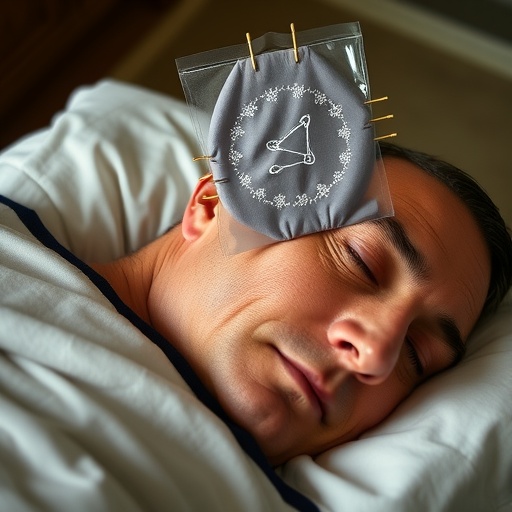In an enlightening development in the realm of complementary medicine, a recent randomized controlled clinical trial offers significant insights into the efficacy of acupuncture as a therapeutic modality for patients suffering from insomnia—particularly those diagnosed with Parkinson’s disease. This detailed investigation, spearheaded by a team of researchers led by Liu et al., seeks to dissect the nuanced impacts of acupuncture versus sham acupuncture in alleviating sleep disturbances—a common, yet frequently overlooked, symptom associated with Parkinson’s disease.
Parkinson’s disease, a progressive neurological disorder, is well-documented for its motility disruptions; however, its mental health implications are often where the discussion falls short. Among these, insomnia emerges as a critical factor that can exacerbate the overall quality of life for patients. The study at hand aims to bridge this gap, focusing on not only the prevalence of sleep disorders in this population but also the potential therapeutic benefits that acupuncture might offer. The intersection of traditional medicine and contemporary scientific inquiry provides a fertile ground for exploration in this trial.
As researchers delved into the intricacies of their study, they meticulously designed a framework to determine whether acupuncture—rooted in centuries of traditional Chinese medicine—could demonstrably outperform a control group receiving sham acupuncture. The latter serves as a vital benchmark in clinical trials, allowing for a more nuanced understanding of the placebo effect and the true benefits of acupuncture techniques. This meticulous approach aims to dissect whether any observed benefits from acupuncture arise from genuine therapeutic action or psychological influences inherent in patient perceptions of treatment.
Participants in the study were carefully selected based on stringent eligibility criteria, designed to ensure that the results would be as scientifically valid and reliable as possible. The cohort comprised patients with a confirmed diagnosis of Parkinson’s disease who also reported experiencing symptoms of insomnia—a frequent issue that leads to increased morbidity. Ethical considerations were paramount throughout this study, with all participants providing informed consent before engaging in the trial.
The acupuncture interventions in the trial were standardized and administered by skilled practitioners ensuring both the authenticity of the treatment and reliability of the results. Each participant’s treatment regimen was tailored to match their specific needs, enhancing the reliability of the outcomes. The sham acupuncture provided to the control group ensured that they received a similar level of attention without the actual insertion of needles but still maintained blinding to preserve the integrity of the study’s findings.
A series of validated scales were employed to assess sleep quality, anxiety levels, and overall health and well-being before, during, and after the treatment period. The findings emerged with compelling clarity. Patients receiving true acupuncture experienced a statistically significant improvement in their sleep quality compared to their sham counterparts. Enhanced measures of sleep efficiency and reduced wakefulness highlighted the remarkable potential acupuncture holds as an adjunctive therapy for insomnia in patients with Parkinson’s disease.
Moreover, the psychological dimensions of sleep disturbances were also considered during the evaluation period. Researchers noted that improvements in anxiety and overall mood among those receiving acupuncture treatments complemented the enhancement in sleep quality. These ancillary benefits underscore the intricate relationship between physical wellness and mental health, particularly within the chronic illness narrative that defines Parkinson’s disease.
While the study’s findings are promising, Liu et al. exercised caution in their conclusions, emphasizing the need for larger sample sizes and extended follow-up periods for these interventions to understand the sustainability of such improvements in sleep quality. The pressing question remains—will acupuncture prove to be a lasting solution for insomnia in this vulnerable population? Future studies may illuminate these possibilities further.
The implications of the study stretch beyond just improving sleep quality. As the healthcare landscape continuously evolves, integrating traditional practices like acupuncture into contemporary treatment paradigms encourages a broader, more holistic approach to patient care. This trial creates a compelling case for interdisciplinary collaborations among neurologists, acupuncturists, and mental health professionals, forming a comprehensive support system for individuals impacted by Parkinson’s disease.
In reflection, this research underscores an essential ethos in the medical community: a commitment to patient-centric care that acknowledges both the physiological and psychological dimensions of health. In a time when the quest for innovative therapeutic strategies is more essential than ever, acupuncture’s re-emergence as a valid treatment modality illustrates the necessity for continual exploration of integrative medicine in contemporary health care practices.
As we elevate the discourse surrounding Parkinson’s disease and its myriad symptoms, studies like Liu et al.’s pave the way for understanding, compassion, and innovation in treatment strategies aimed at improving patient outcomes. As this body of research evolves and proliferates, it is clear that acupuncture’s potential to alleviate insomnia in patients with Parkinson’s disease deserves our attention and consideration.
In conclusion, the findings presented by Liu and colleagues are more than just statistical outcomes; they represent a pivotal step in recognizing the holistic needs of Parkinson’s disease patients. As the medical community begins to embrace a more integrative approach to treatment, the prospects for those battling insomnia and the debilitating effects of chronic diseases like Parkinson’s must remain at the forefront of future discussions. The significant correlations observed between acupuncture treatment and improved quality of sleep challenge us to reconsider our existing paradigms, enabling a more compassionate and effective response to chronic illness.
Subject of Research: Acupuncture versus sham acupuncture for treating insomnia in Parkinson’s disease patients.
Article Title: Acupuncture versus sham acupuncture in the treatment of insomnia for patients with Parkinson’s disease: a randomized controlled clinical trial.
Article References: Liu, S., Li, H., Zhang, J. et al. Acupuncture versus sham acupuncture in the treatment of insomnia for patients with Parkinson’s disease: a randomized controlled clinical trial. BMC Complement Med Ther 25, 278 (2025). https://doi.org/10.1186/s12906-025-05009-3
Image Credits: AI Generated
DOI:
Keywords: Acupuncture, Parkinson’s disease, insomnia, randomized controlled trial, complementary medicine.




